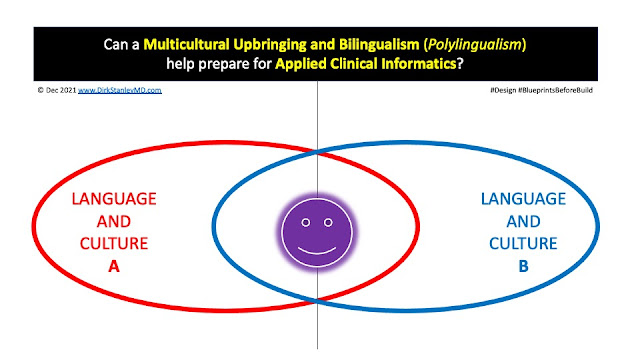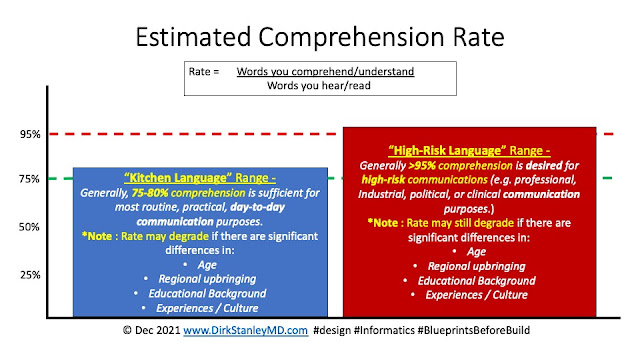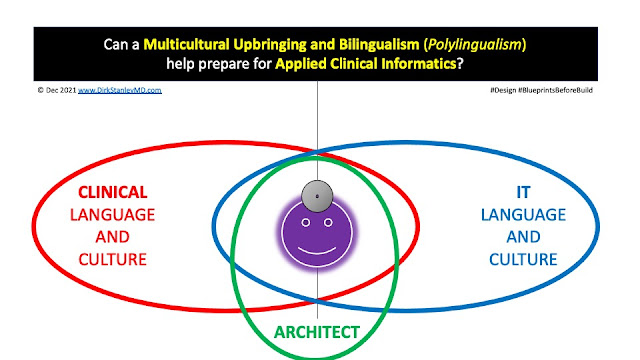Hi fellow CMIOs, CNIOs, Clinical Informaticists, and other HealthIT friends,
Can growing up in a multicultural, bilingual (or polylingual) household help to prepare you for a career in Applied Clinical Informatics? In today's post, I'll explain why I believe the answer to this is "Yes".
Almost all of my Applied Clinical Informatics colleagues that I've met over the years have amazing educational and experiential backgrounds. However, I've noticed that a surprising number of them also come from multicultural backgrounds, where they grew up speaking multiple languages.

In full disclosure : I don't have great data to support this claim. And I might be biased (or more sensitive) to this issue because I grew up in a polylingual household myself, the son of a German immigrant mother and a polyglot American father, who counted German as one of this favorite and most fluent languages.
My father's passion for languages started as a high school student in Yonkers, NY, and would continue to develop until he became a Military Policeman (MP) for the US Army, in Germany, where he also served as a court interpreter. This would also eventually lead him to meet my mother (who had immigrated from Herford, Germany to Westchester County, NY), and to a future career as a high school language teacher at White Plains High School in White Plains, NY.
So with parents like these, I grew up in a multicultural, multilingual household, where we commonly spoke German at home, and then spoke English when other people came to visit our house. Vacations were often spent visiting relatives in Germany, immersed in German language and culture, before returning to America and resuming daily activities in English.
Given my father's interpreter experiences, he always took languages and translation very seriously. Growing up outside of NYC in the 1970s and 1980s, he would occasionally take me into the city to the United Nations, to learn about and watch the famous UN Interpreter pool at work. Over our dinner table, we would often discuss the inseparable bond between culture and language, the real responsibilities of professional interpreters, and the occasional fallibility of both written and spoken words.
This sort of cross-cultural upbringing led me to some frequent challenges, that most multicultural people can probably relate to :
- Having to explain "American things" to my German family.
- Having to explain "German things" to my American friends.
- Occasionally having to do real-time interpretation of English-to-German, and German-to-English, to facilitate discussions between my German family and American friends.
I didn't fully appreciate this sort of multicultural upbringing until I was older, and learned that not everyone struggled with (or learned to manage) these types of issues.
One of the things you learn from this sort of cross-cultural upbringing is that communication is actually much more frail and fragile than you might imagine. Success often depends on a number of factors helping you achieve a desired comprehension rate :
For most routine, practical, day-to-day communications, about 75%-80% comprehension is just fine. Typically, your brain fills in the gaps (without your awareness), and you usually don't even notice the small details you might have missed. It still gets you to work, gets you to dinner on time, lets you order food at restaurants, and lets you manage your typical day-to-day activities. Informally, I personally refer to this as "Kitchen Language", since it's what you'd typically hear in a kitchen when people are making dinner and talking about their day. Failures sometimes happen, but when they do - they usually only result in some brief confusion, a wrong or forgotten birthday gift, or an impromptu discussion about 'ineffective communication' from a loved one. After a little more discussion - The error or conflict usually gets resolved. Failure is usually pretty well-tolerated.*Interesting historical side-note :
Ever wonder about the June 1961 Cuban Missile summit between Kennedy and Kruschev? Viktor Sukhodrev was the interpreter in between them - Talk about responsibility for ensuring both accurate translation and comprehension!
So in closing - I'd say a bilingual (or polylingual), multicultural upbringing can serve as an excellent model for the same interpretation functions that Applied Clinical Informaticists provide in their daily work. It would be interesting to do some formal research into these concepts, to help confirm the value of this sort of early training.





No comments:
Post a Comment